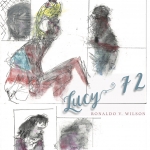RONALDO V. WILSON – LUCY 72
 $17.00
$17.00
Ronaldo V. Wilson explodes all over the mouth of whiteness in LUCY 72 like Cesaire stroking the Latin root “niger,” courting its deranged figuration. With satire, grace, deep lyric reflection, and inside of the persistent strangulation of a rigorous couplet, the radiant poems in LUCY 72 are a working out and a working on this thing we call “race.” In these poems, whiteness is abstracted away from color and made manifest in gesture, a relaxed state, a non-awareness, and certain preferences and unperceived privileges. Wilson strips down the symbolic figure, Lucy, exposing her blind and deaf obsession with her own whiteness—“One of my favorite words is alabaster” —and cranks our eyes toward these brutal cultural tropes: there is “a black” and then there is the effortless abstraction of whiteness; blackness is opaque; whiteness is transparent; blackness, hard object, whiteness, effervescence. LUCY 72 is a haunting, gorgeously written, and absolutely necessary book for our times. When Lucy speaks, we should all listen closely.
-Dawn Lundy Martin
Lucy’s language scintillates like the surface of the country lakes and rivers where she anoints herself all summer. Rich and textured, these dappled refractions reveal her to herself in fragmentary patterns. Not a mask, Lucy is “an idea,” an avatar through whom Wilson poignantly explores the white imagination that continually reconstructs race in America despite our knowing it is a fiction. Just as race is an unstable category, Lucy herself continually shifts: white woman, black man, thin, thick, invisible, seen, gray haired and orange-maned, she lives in “the thicket of my projections,” imagining herself unmarked, while knowing such absence is impossible. Presided over by the white noise of fans that help her sleep despite terrifying dreams that mirror our reality of “no face, only a body, wrapped and in the street,” her verdant world is hemmed in by screens she feels pressed against. Lucy’s double consciousness asks, “Isn’t it strange—to court my own life—through another?” It’s our privilege that Wilson has done so in this haunting, surreal, and powerful book. Its beauty and anger are absolutely urgent.
-Amaranth C. Borsuk
LUCY 72 is an intricate, multi-faceted, rarely used underhand serve executed with the power and skill of a masterful languager. Wilson undertakes and asserts a new kind of self-reflexive portraiture in which all manner of “body” is addressed. The body historical, the racial body, the flesh body, all gather in an open-air refusal to conform, to resign. Here agency is fiercely nuanced—petaled and thorned. . .the gloves have come off. Raise your racquet. Loose your head and heart. These poems are a guidebook of rosary beads for crossing the street, returning an out-wide serve, and for being transcendently human.
-giovanni singleton
Reading LUCY 72 is like getting to hear today’s Galatea as she steps off her pedestal, “a site of labor,” connected to and estranged from herself / the world by a dependence on images, desperately attempting to understand what parts of the evolving reality she can control in order to feel “safe,” and how to manage intimacy within those constraints. Lucy for Lucifer, for light, Wilson’s almost heteronym is a devilishly brilliant invention, an enormously successful gurrrlilla action, a set of strategic and unstoppable forays into the possibilities of the imagination, a fierce embodiment of white fragility “out at the dead edge of flow,” allowing the poet to both gather and release the “given”s of gender and race. Lucy (whose name suggests an allusion to Wordsworth’s dead love as well as to the fossil specimen or ancient “row of bones” returned to Ethiopia in 2013) performs femininity / whiteness and dreams masculinity / blackness—to illuminate the uneasy in-between space where each is shaped or played against the other. In these couplets the myriad ways in which identity is always already an idea are exposed, but this false body has real feelings, and the poet’s exploration of a looser proprioception enlarges and complicates empathy in what Paul Gilroy calls “an atmosphere of certain uncertainty,” where the liminal becomes luminous.
-Laura Mullen